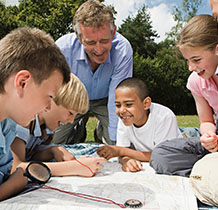Resource Database

Click on a topic or use the search box below to look for a listing:
There are 488 resources. Displaying 10 resources per page.
It is easy to forget about physical activity during times of stress, but staying active and keeping a routine can promote physical and mental well-being. This article from the Alliance for a Healthier Generation has some fun, family-friendly activities that adults and youth can try together.
View Resource
Project-based learning (PBL) can take place in environments outside of school or afterschool programs. This article from Edutopia shows how educators are supporting project-based learning when students are at home. The article includes guidance for educators and strategies for supporting parents as they engage in PBL with their youth.
View Resource
Inside Mathematics provides online mathematics instruction support for educators around the world. Resources include tools for educators, video lessons, Common Core State Standard resources, performance assessment tasks, and math Problems of the Month with video examples.
View Resource
Academic Enrichment
A new article from Edutopia explores how educators are integrating math and science with English language arts. The article outlines the benefits of integrating these content areas, provides instructional examples, and discusses how educators address some of the challenges.
View Resource
Academic Enrichment
Mistakes provide opportunities for students to learn and for educators to reflect on instructional practices and learning goals. This blog post from Achieve the Core, a website that supports the implementation of Common Core State Standards, describes how one educator revised his approach to understanding student mistakes. New strategies include using a student’s mistake to ask what learning goals a teacher should pursue and then customizing learning to support these goals.
View Resource
Academic Enrichment
You for Youth (Y4Y), the U.S. Department of Education web portal for 21st CCLC practitioners, has an updated literacy course. Offerings include an introduction to afterschool literacy, implementation strategies, staff coaching, a list of ready-to-use tools, and a “learn more library” with links to external resources.
View Resource
Academic Enrichment
The National Child Traumatic Stress Network has developed fact sheets on how families, youth, and community organizations cope during times of financial difficulty. Each fact sheet helps the audience understand how economic challenges can affect them and their sense of safety. The fact sheets also provide tips for how individuals and organizations can promote a sense of security, calm, self-efficacy, connectedness, and hope.
View Resource
In response to recent challenges in education and surrounding communities, the Collaborative for Academic, Social, and Emotional Learning (CASEL) has launched CASEL CARES, a new initiative that connects the social and emotional learning (SEL) community with experts to address how SEL can be most helpful in response to today’s circumstances. The initiative has included a webinar series on different SEL topics, including the importance of SEL, supporting SEL at home, and resilience.
View Resource
The National Afterschool Association (NAA) has started an initiative to close the racial leadership gap among afterschool programs and the youth they serve and to advance equity in the afterschool field. With its broader strategy to close the leadership gap, NAA is working to build the capacity of leaders of color. One part of this effort is a new report by NAA and Policy Studies Associates. The report identifies a racial leadership gap across the nonprofit sector, including afterschool, and provides recommendations for supporting emerging leaders of color.
View Resource
Diverse Learners
A new article in the Journal of Youth Development, “Sustaining Passion: Findings from an Exploratory Study of the OST Program Workforce,” examines results from a survey of 264 out-of-school time (OST) professionals who shared how they felt about their field. Respondents reported that they found value in the relationships they formed with youth and seeing them develop over time, as well as the connections they felt with coworkers and the community. Respondents also said that overall the OST field lacks foundational workforce elements, such as financial stability, a competitive level of pay, and benefits.
View Resource
Program Management
There are 488 resources. Displaying 10 items per page.
- Academic Enrichment
- Afterschool Enrichment
- Classroom Management
- College and Career Readiness
- Diverse Learners
- Family and Community Engagement
- Program Management
- Social-Emotional Learning
- Sustainability
- Technology
Subscribe to the Illinois Quality Afterschool newsletter and resource bulletin.
